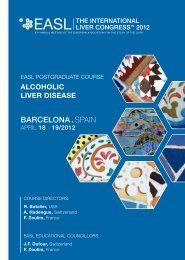BACKGROUND MEDIA INFORMATION VIRAL HEPATITIS
BACKGROUND MEDIA INFORMATION VIRAL HEPATITIS
BACKGROUND MEDIA INFORMATION VIRAL HEPATITIS
Create successful ePaper yourself
Turn your PDF publications into a flip-book with our unique Google optimized e-Paper software.
Infection with the hepatitis B virus can cause an acute illness that resolves itself quickly without<br />
causing long-term liver damage. However, hepatitis B causes long-term (chronic) illness in 90% of<br />
infected infants and five to 10% of adults. 7 Approximately 25% of those with a chronic infection will<br />
later die from liver cancer, liver disease or cirrhosis. 2<br />
Hepatitis C<br />
Worldwide, approximately 170 million people are chronically infected with the hepatitis C virus and<br />
the WHO estimates that 3-4 million people are newly infected each year. 3<br />
Hepatitis C virus is present in the blood and, to a much lesser extent, the saliva, semen or vaginal<br />
fluid of an infected person. As such, it is most commonly spread through direct contact with<br />
infected blood. 3<br />
Hepatitis C is regarded as a silent killer because patients often experience no symptoms for years.<br />
Frequently, when symptoms do present themselves, they are commonly mistaken for signs of cold<br />
or „flu. The course of hepatitis C is unpredictable: about one in five people eliminate the infection<br />
while others may develop mild to moderate liver damage. 8 Alcohol consumption and co-infection<br />
with the HIV virus are known to accelerate liver damage. 9<br />
Hepatitis C infection can be categorised into two stages – firstly an acute stage (following initial<br />
infection, sometimes with no symptoms) and secondly a chronic stage. Approximately 20% of<br />
people will naturally clear the virus from their body and experience no long-term effects. However,<br />
for the remaining 80%, a chronic (long-term) infection will develop. Confusingly, there seems to be<br />
no clear relationship between the degree of liver damage and the experience of symptoms. 10<br />
What are the rarer types of hepatitis<br />
Hepatitis D<br />
The hepatitis D virus can only survive within the body if hepatitis B virus is also present, and so<br />
only affects those who are also infected with hepatitis B. 2<br />
The combination of hepatitis viruses D and B can be more serious than the B virus alone and is<br />
more likely to cause chronic hepatitis and cirrhosis. 4 Vaccination against hepatitis B virus will<br />
prevent hepatitis D infection. 11<br />
Hepatitis E<br />
Hepatitis E is generally a mild and acute (short-term) infection. Person-to-person transmission is<br />
rare and the virus is most commonly spread by the consumption of food or drink infected with<br />
faeces contaminated with the virus. 2<br />
How is viral hepatitis diagnosed<br />
Diagnosis of viral hepatitis is based on symptoms and blood tests that detect liver enzymes, virus<br />
particles, or antibodies against viral components. 1












